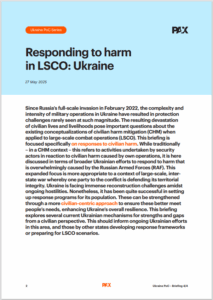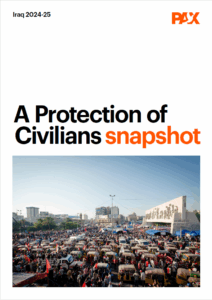Community Security Dialogue in Juba, Jubek State (South Sudan)
In the first week of August, PAX and SSANSA organized a three-day community security dialogue in Juba, Jubek State. The meeting had several objectives: (1) informing participants about community views regarding security, collected by means of the Human Security Survey (HSS) in November 2018, and discussing and validating these views; (2) identifying and ranking the security issues that are currently most pressing in the community; and (3) developing an action plan that the Community Security Committee (COMSECCOM) can work on for improving the security situation in the community.
Discussing the security situation
Around 40 representatives of chiefs, police officers, prison services, farmers, government officials, students, women, youth, local NGOs, and community workers were present in the dialogue. The first day was all about presenting and discussing the November 2018 community views. The survey results showed that slightly over half of respondents (54%) were positive about the change in the personal security situation (i.e. ‘it improved’), mainly because there was less violence (90%) and crime (87%) than a year ago. Indeed during the dialogue it was confirmed by representatives of the police that less cases are reported this year compared to a year ago. Although the security situation is still not good enough, and differences exist from one payam to the other, it at least improved.
When zooming in on both represented counties, Rejaf and Mangalla, survey respondents show different experiences related to threats: in Mangalla a higher percentage of respondents reported incidents of robbery and murder/killing, while in Rejaf this was the case for assault with a weapon and beating. These differences were at least partly explained by dialogue participants due to the location of both counties: Rejaf is very close to Juba and has a higher presence of security forces, while Mangalla is more remote and bordering Terekeka State. This latter fact increases the likelihood of cattle raiding by neighboring communities, and correspondingly murder/killing and child abduction.
Identification of security threats and development of action plan
Between December 2017 and August 2019, the Community Security Committee (COMSECCOM) has been working on the previously identified security issues and action plan. The relevance of this action plan for 2019 has been discussed, and the action plan was updated accordingly. The updated list of most pressing security threats for Jubek state include: (1) poverty, hunger, and cutting down of trees; (2) child abduction; (3) raping and sexual assault; (4) tension between pastoralists and farmers; (5) land grabbing and land disputes; (6) (armed) robbery; and (7) presence of gangs.
Examples of actions that the COMSECCOM will be working on in the coming months include:
- Advocating for procedures that everyone travelling with children should carry a document proving that the children are theirs;
Awareness raising among both farmers and pastoralists about the ‘seasonal migration route of cattle’, so that the incidence of cattle destroying crops is reduced;
Awareness raising to women and girls about the importance of reporting cases of sexual assault and raping to the police;
Working together with local NGOs (like SSANSA, AMA and OPP) and possibly the Child Protection Unit of UNMISS to organize peacebuilding activities involving youth (esp. in areas where gangs are active).
The diverse nature of the COMSECCOM, consisting of both men and women from several sections in society, will likely be helpful in working on this action plan. In the meantime, SANSSA, AMA and PAX, will, together with the Jubek community members, keep track of security threats in the area, support the work of the COMSECCOM, and prepare for the next round of HSS data collection in Jubek state.
About this news
Date of publication:
Aug 26, 2019
Author:
Marieke Meeske

